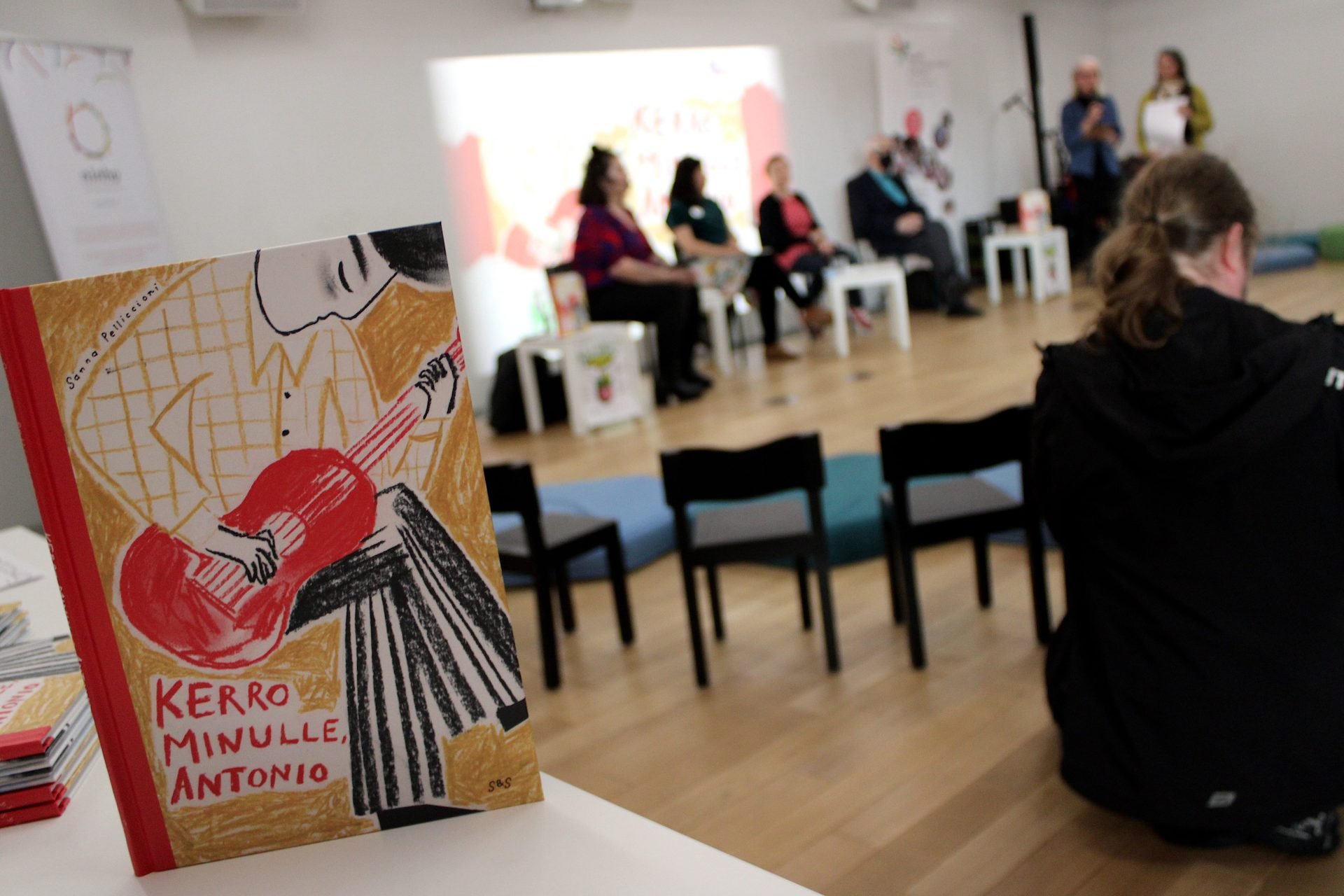Kulttuurikeskus Ninho arrived at Oodi on 20.9. with “En laula vain laulaakseni”. It was a beautiful event where art, music, and literature came together to celebrate hospitality, friendship, multiculturalism, and to commemorate the life stories behind the Chilean families who arrived in Finland 50 years ago seeking refuge.
The central theme of this event was the book Kerro minulle, Antonio (S&S, 2023), by Finnish writer and illustrator Sanna Pelliccioni, including an art workshop and a concert, that gathered around 100 people of all ages.
We had the privilege of sharing this evening with members of the first group of Chilean refugees who arrived in Finland in the 70s, including some of their daughters and sons. Moreover, representatives from art, cultural and diversity institutions joined us, as well as many families from Mexico, Ecuador, Peru, Chile, Spain, Finland, and Argentina, among other places.
Children’s Art for Global Peace:

The event began with a lovely art workshop designed and facilitated by Sanna Pellicioni, and assisted by Mexican designer Mariana Núñez Sánchez.
Under the title “Children for Global Peace and Hospitality,” the workshop invited families to create peace doves on cardboard, decorated with various materials.
As is typical in all Kolibrí activities, both young and old unleashed their creativity, sharing quality moments in their mother tongue and forging new friendships.
Kerro minulle, Antonio, immersive talk:
Children’s literature also took the spotlight with an immersive discussion where we were fortunate to have the author of the book, Sanna Pelliccioni, the person who inspired it, Chilean professor Alfonso Padilla, and children’s literature translator and TAIKE member Anna Sidorova. Activist Javiera Marchant Aedo moderated this engaging conversation, in which Padilla recounted how he experienced the difficult moments of the coup d’état.
This challenging topic to address in this illustrated children’s book, designed for children aged 4 and up, emerges as an opportunity not only to remember the stories of so many people who had to flee their country, but also to reflect on questions like what war is, why many people in this world must leave their homes, and the need for peace and hospitality in our world.
The author, Sanna Pellicioni, once again showcases in this work her constant interest in the situation of minorities. During her presentation, she shared the creative process behind this work, which, despite not being autobiographical, is based on conversations she had with Professor Alfonso Padilla. Many conversations aimed at better understanding what happened in Chile and with Chilean families after the coup d’état in ’73, to address the topic in a way understandable for children.
Translator and expert Anna Sidorova expressed her conviction about the power of books and stories in children’s education. She also shared her opinion on the performance of official institutions, which “should support bilingual children’s literature more,” as well as publishers, who should “publish more children’s books by local writers who write in their mother tongue.”

Regarding literary diversity in libraries, activist Javiera Marchant Aedo emphasized the need not only for Finnish libraries to have books in Spanish, but also for a greater variety of works from all Spanish-speaking countries, thereby improving the representation and access of children to the rich diversity of the language.
As in all Kolibrí events, the audience (children included) had the opportunity to actively participate, raising such fundamental questions in today’s Finland as what we can do as a society to enable children to tell their own stories, how to create safe spaces for young people to develop the culture of their family roots, as well as the importance of strengthening the existing multiculturalism in the country.
A beautiful finale to sing together:
Musicians Rodrigo Rodríguez (CL), Tito Chauca (PE), and Mikko Nousiainen (FI) closed the event with a family concert, where both young and old enjoyed songs by Víctor Jara, as well as traditional rhythms from Mapuche culture and the Andean Aymara cultures. Children were introduced to indigenous instruments like the Trutruca, Quenacho, trompe, and Sikuris, and they even participated in creating rhythms as ancient as Tinku or the Peruvian Hayno.

“En laula vain laulaakseni” was a production by Kulttuurikeskus Ninho ry for Kolibrí Festivaali and Chile50 in cooperation with Oodi. Funded by: TAIKE, Helsinki City, Svenska Kulturfonden, and Kustantamo S&S.
Text: Teija Potenze, Laura Gazzotti and Marta Bermúdez. / 📸 Kulttuurikeskus Ninho.
Remember Kolibrí Festivaali is organised by the association Kultturikeskus Ninho and you can find more events like this one all year around! Follow us and stay tuned!
